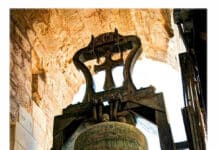The 2nd excavation phase of the old settlement of Mojácar known as “Mojácar La Vieja” has started once again in the town, led by MemoLab, Granada University’s Biocultural Archaeology Laboratory.
The official presentation of this summer´s project, which has the collaboration of the local Council and the Valparaíso Foundation, was made by; Emmanuel Agüero, local Councillor for Tourism, José María Civantos, Director of Archaeology, along with Lara Delgado, also from MemoLab.
Emmanuel Agüero firstly expressed the level of interest that the people of Mojácar had shown in last year´s excavation in both archaeological and cultural terms, which is also of great importance to the whole province. He went on to speak about this year’s increased financial input from the Council, in order to involve a larger number of archaeologists and, the application for funding for 2020 from the Junta de Andalucía. In addition, private companies are being approached for support, so that this historical and cultural investigation may be continued.
Also present at the official presentation were Mojácar’s Mayor, Rosmari Cano, other members of the Council as well as Valparaiso Foundation Director, Beatrice Beckett.
José María Civantos gave an overview of the work planned for July, which will be a continuation of that carried out in 2018 in the area of the wall and the upper zone where the main water deposit, military structure, small hermitage and other quarters are located.
In the wall area, they will face an accessibility challenge as the customary path to the area does not correspond to the original one, shown up by the discoveries made by the wall’s tower entrance. One of the tasks on the site this time will be the excavation of a house discovered last year that is in a good state of conservation and, its restoration may well serve to gain a better understanding of life in Mojácar at that time.
In the upper part, the objective is to finish the dig on the military guard structure and its old entry, as it could lead to further information regarding any defence or armed activities.
The tie-in free cultural programme taking place at the same time was then highlighted by Lara Delgado, which will feature workshops especially for the children as well as classes on esparto crafts, past costumes and even how to carry the old water jugs on the head. You can also learn how to be an archaeologist for the day and take part in the excavations guided visits. Also on offer are, archaeological pottery workshops and a participative session of map making relating this year to Mojácar’s historical system of irrigation.
As an indication of the importance and great interest that Mojácar La Vieja has created in the archaeology world, this second phase received 362 applications from archaeologists of 24 different nationalities around the world. Forty archaeologists from 9 countries were finally selected from Italy, Portugal, France, Armenia, Hungary, Bulgaria, Sri Lanka, Argentina and Mexico.
News has certainly travelled across international borders since the project was initiated, with Granada University receiving continuous requests for more information and updates on all the discoveries and findings that are being identified on this fascinating ancient settlement.





